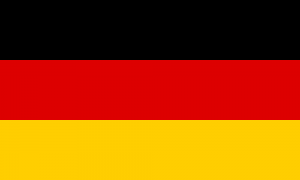
The following content was taken from Wikipedia:
Germany, officially the Federal Republic of Germany, is a federal parliamentary republic in central-western Europe. It includes 16 constituent states, covers an area of 357,021 square kilometres (137,847 sq mi), and has a largely temperate seasonal climate. With about 82 million inhabitants, Germany is the most populous member state of the European Union. After the United States, it is the second most popular immigration destination in the world. Germany’s capital and largest metropolis is Berlin. Major urban areas include Ruhr, Hamburg, Munich, Cologne, Frankfurt, Stuttgart and Düsseldorf.
Various Germanic tribes have occupied the northern parts of modern Germany since classical antiquity. A region named Germania was documented before 100 AD. During the Migration Period the Germanic tribes expanded southward. Beginning in the 10th century, German territories formed a central part of the Holy Roman Empire. During the 16th century, northern German regions became the centre of the Protestant Reformation.
In 1871, Germany became a nation state when most of the German states unified into the Prussian-dominated German Empire. After World War I and the German Revolution of 1918–1919, the Empire was replaced by the parliamentary Weimar Republic. The establishment of the national socialist dictatorship in 1933 led to World War II and a genocide. After a period of Allied occupation, two German states were founded: the Federal Republic of Germany and the German Democratic Republic. In 1990, the country was reunified.
In the 21st century, Germany is a great power and has the world’s fourth-largest economy by nominal GDP, as well as the fifth-largest by PPP. As a global leader in several industrial and technological sectors, it is both the world’s third-largest exporter and importer of goods. Germany is a developed country with a very high standard of living sustained by a skilled and productive society. It upholds a social security and universal health care system, environmental protection and a tuition-free university education.
Germany was a founding member of the European Union in 1993. It is part of the Schengen Area, and became a co-founder of the Eurozone in 1999. Germany is a member of the United Nations, NATO, the G8, the G20, and the OECD. The national military expenditure is the 9th highest in the world. Known for its rich cultural history, Germany has been continuously the home of influential artists, philosophers, musicians, sportspeople and entrepreneurs. It is a global leader in science and technology.
Germany. (n.d.). In Wikipedia. Retrieved November 23, 2016, from https://en.wikipedia.org/wiki/Germany